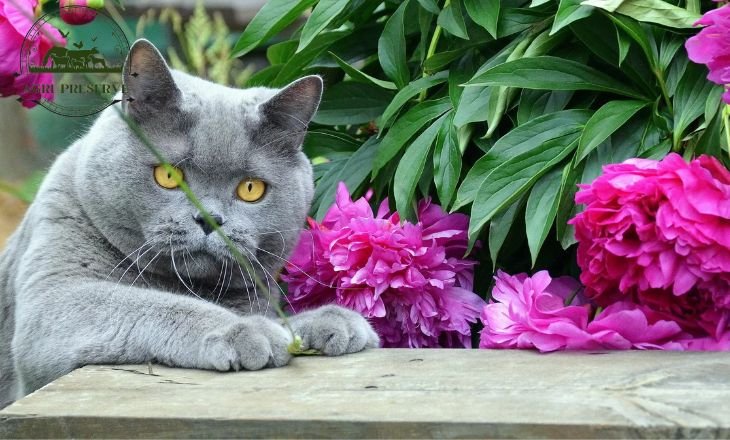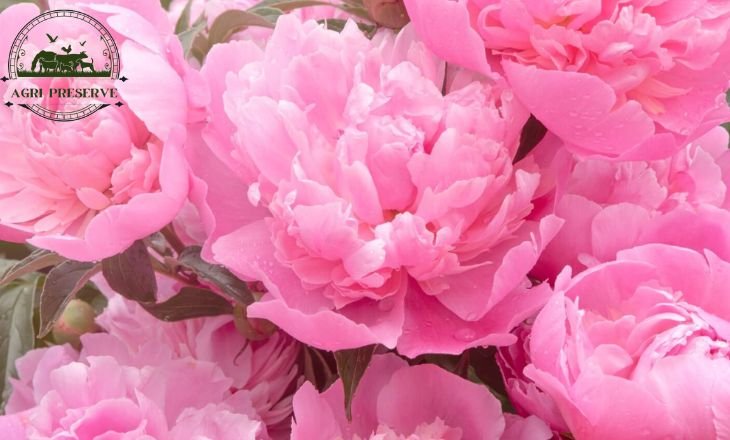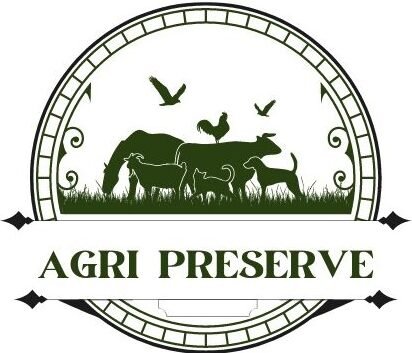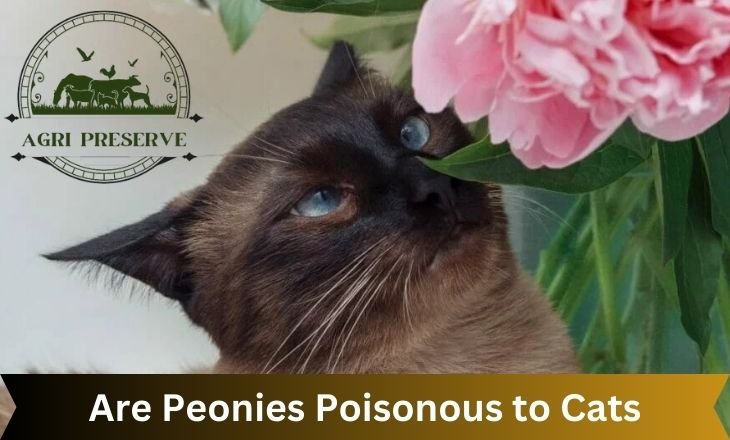If you have a cat and like pretty flowers, you might be worried if Are Peonies Poisonous to Cats. Peonies are beautiful and smell good, so they are popular for bouquets and gardens. But they could be harmful to our cats. Let’s find out if peonies are safe for cats. Join us as we learn about flowers and cats to understand if these lovely blooms are safe for our furry friends.
Are Peonies Poisonous to Cats – Our Guide
Peonies are pretty flowers that many people like to have in their gardens or bouquets. But if you have a cat, you should know that peonies can make them sick if they eat them.
Cat owners should make sure their pets can’t get near peonies, inside or outside. If a cat eats peonies by accident, it’s important to get help from a vet right away to reduce the harm from the toxins.
types of peonies
Peonies come in three main types: herbaceous, tree, and intersectional. Herbaceous peonies are the most common. They have colorful blooms in spring, die back in winter, and return the next year. Tree peonies are woody shrubs with big, colorful flowers in shades from white to red.
Herbaceous peonies
Herbaceous peonies, known for their stunning blooms and lush foliage, have captured the hearts of garden enthusiasts for centuries. These perennial beauties come in a wide range of colors and forms, from delicate pastels to vibrant hues, making them a versatile addition to any garden.
Tree peonies
Tree peonies are often revered for their exquisite beauty and unique characteristics. With their woody stems and large, showy blooms, they add a touch of elegance to any garden landscape.
What sets tree peonies apart from herbaceous peonies is their longevity – some varieties can live for decades, becoming treasured heirlooms in the process.
Itoh peonies
Itoh peonies, a beautiful hybrid between tree and herbaceous peonies, are gaining popularity among gardeners for their unique characteristics. These stunning flowers exhibit the best qualities of both parent varieties, boasting strong stems and large blooms in a wide range of colors.
Peony colors
Peonies come in a stunning array of colors, each one more captivating than the last. From the vibrant fuchsia hues to the delicate pastel tones, peonies offer a wide range of colors to choose from.
One fascinating aspect is how certain colors can evoke different emotions – for instance, pink peonies often symbolize love and romance, while white peonies signify purity and innocence.
White peonies
White peonies symbolize elegance, purity, and peace, making them a popular choice for weddings and special occasions. The delicate petals of the white peony evoke a sense of tranquility and serenity, creating a stunning focal point in any floral arrangement.
These flowers are also rich in symbolism, representing new beginnings and blessings for the future.
Pink peonies
Pink peonies have long been associated with beauty, romance, and prosperity. These stunning flowers are often used in weddings and other special occasions due to their delicate fragrance and elegant appearance. The lush petals of pink peonies symbolize good fortune and a blissful life ahead.
Purple peonies
Purple peonies are a rare and enchanting sight in the world of flowers, captivating onlookers with their unique hue. These majestic blooms exude a sense of mystery and elegance, standing out among more common flower varieties.
The rich purple tones of peonies add a touch of sophistication to any bouquet or floral arrangement, making them a popular choice for weddings and special occasions.
Yellow peonies
Yellow peonies bring a unique touch of sunshine to any garden, standing out among their more common pink and white counterparts. Their bright color symbolizes joy, friendship, and new beginnings, making them a perfect choice for weddings or special occasions.
Orange peonies
Orange peonies are a rare and unique variety of the traditional peony flower, known for their vibrant and eye-catching hue. Unlike the more commonly seen pink or white peonies, orange peonies add a pop of color to any floral arrangement or garden setting. T
Recognizing the Symptoms of Peony Poisoning in Cats
Peonies are pretty flowers that can be harmful to cats if eaten. It’s important to know the signs of peony poisoning in cats to get them help quickly.
- Stomach and small intestine: Vomiting
- Colon or small intestine: Diarrhea
- Kidneys: Excessive drinking
- Respiratory tract: Difficulty breathing
- Mouth, throat, or esophagus: Difficulty swallowing
peonies and cats
Peonies and cats are different but go well together. Peonies are beautiful with colorful petals, while cats are playful and curious. When they interact, it’s charming and mysterious. Cats like the smell of peonies and may play with the petals or sit near them, creating a peaceful and warm feeling.
The contrast between the delicate peonies and the independent cats shows the balance between nature’s beauty and wildlife’s instincts. Seeing them together brings a sense of calm and beauty.
Are Peonies Toxic To Cats
Peonies are a popular and beautiful flower often found in gardens and floral arrangements. Many pet owners may not be aware that peonies can be toxic to cats if ingested. The ASPCA lists peonies as potentially harmful to felines, causing symptoms such as vomiting, diarrhea, and lethargy if consumed.
Cat owners must be cautious when decorating their homes with peonies or planting them in their outdoor spaces. While the toxicity level of peonies is considered mild compared to other plants, it’s essential to take preventative measures to ensure your cat’s safety.
Consider opting for pet-friendly flowers like roses or sunflowers instead to create a safe environment for your furry friends.
Can Cats Eat Peonies
Cats like to nibble on plants, but peonies are toxic to them. These pretty flowers can harm cats. Cat owners should know about dangerous plants. If you have peonies, keep them away from curious cats.

are peonies safe for cats
Peonies are pretty flowers that many people like to have at home. But, if you have a cat, you should know that peonies can be harmful if your cat eats them. While peonies are not very poisonous to cats, they can make them sick with vomiting or diarrhea if they eat a lot. It’s best to be careful and keep peonies away from cats.
If your cat likes to explore and nibble on plants, you might want to choose other flowers or plants that are safe for pets.
Provide Treatment
Cat owners should remember that each cat is unique and may respond differently to treatment. Consulting with a vet to create a personalized plan based on your cat’s needs is crucial. Treatment options include medications, acupuncture, and herbal remedies. Both traditional and complementary therapies can be beneficial.
Focusing on nutrition, exercise, and mental stimulation can also support your cat’s well-being and improve the effectiveness of the treatment plan.
are cats allergic to peonies
While it may seem like a harmless flower, peonies can pose a potential danger to our feline friends. Cats are not necessarily allergic to peonies, but all parts of the plant are toxic if ingested.
The compounds found in peonies can cause gastrointestinal upset, such as vomiting and diarrhea, as well as more severe symptoms like lethargy and difficulty breathing in cats.
Immediate Actions If Your Cat Has Ingested A Peony
If you see your cat eating a plant and are unsure if it’s toxic, follow these steps before contacting your vet:
- Avoid trying to make the cat vomit, as only a professional can decide that.
- Clean any plant material from the cat’s body.
- Keep the cat in a secure area for monitoring.
- Reach out to the Pet Poison helpline or Animal Poison Control.
Identifying the plant is important for proper treatment; if unsure, take a sample or photo to the vet.
How Can You Keep Your Cat Away From Peonies
To keep your cat away from peonies, use natural deterrents like citrus peels or vinegar. Cats don’t like the strong smell of citrus, so put orange or lemon peels near your peony plants. Spraying a mix of water and vinegar on the leaves can make them taste bad for cats and stop them from eating the flowers.
You can also make a special area in your garden with safe plants for cats, like catnip or cat grass, to distract your pet from harmful flowers like peonies.
Popular Flowers And Their Toxicity To Cats And Dogs
Lilies: These are popular flowers known for their beauty and fragrance, but they can be highly toxic to cats. Even small amounts of lily can cause severe kidney damage in felines if ingested.
Daffodils: Another commonly loved flower, they pose a threat to both cats and dogs. The bulbs of daffodils contain toxins that can lead to vomiting, diarrhea, and even cardiac arrhythmias when consumed by pets.
Roses: They are a classic symbol of love and affection, but they are generally safe for both cats and dogs. It’s essential to keep an eye out for thorns that could potentially harm curious pets.
Sunflowers: They are a vibrant addition to any bouquet or garden, but their seeds can be harmful if eaten by pets due to potential gastrointestinal blockages. Remembering these toxicity levels will help pet owners make informed decisions when choosing flowers around their furry companions.
Pet-Safe Flowers And Plants
Cats are curious and playful animals, but they can get sick if they eat certain flowers and plants. Lilies are especially dangerous for cats and can make them very ill. Cat owners need to choose plants that are safe for pets.
African Violets: They can help keep your feline friend safe while adding a touch of greenery to your home.
Black orchid flowers: They are safe for cats, so they are a nice addition to a home with cats. These flowers are exotic and mysterious, adding elegance without harming cats.
Snapdragons: These beautiful blooms pose no toxic threat to our feline friends, making them a great choice for cat lovers looking to brighten up their gardens without worrying about potential harm.
Are spider plants toxic to cats: Spider plants are not considered highly toxic to cats, but they can still cause mild gastrointestinal upset if ingested in large quantities.
What IsThe Most Toxic flower To Cats?
One of the most toxic flowers to cats is the lily, particularly popular varieties like Easter lilies, Asiatic lilies, and Peace lilies. While these flowers may add beauty to our homes, they can pose a severe danger to our feline friends if ingested.
can peonies kill cats
These flowers are also toxic to dogs and cats, which is why they are popular in birthday bouquets. Peonies contain phenol, a poison known to be harmful to both cats and dogs. Ingestion of peonies can cause mild to moderate poisoning. The most common signs to look out for include gastrointestinal upset, vomiting, and diarrhea.

Conclusion
Cat owners need to be aware of the potential risks associated with peonies and their toxicity to cats. Are Peonies Poisonous to Cats plant is not necessarily lethal; ingesting any part of the peony can still lead to discomfort and health issues for our feline friends. It is advisable to keep peonies out of reach of cats or opt for alternative, non-toxic plants in your home if you have a curious pet.
If you suspect that your cat has ingested peonies and is exhibiting symptoms of poisoning, seek immediate veterinary care. Remember, ensuring a safe environment for our pets includes being mindful of the plants we bring into our homes.
When to plant dahlias for a vibrant garden! Find the perfect timing and tips for growing dahlias successfully.
Frequently Asked Question
Are Peony Tulips Safe For Cats?
Yes, it is generally safe for cats to be around peony tulips.
Are Peony Tulips Safe For Cats?
No, it is not safe for cats to consume peony petals.

